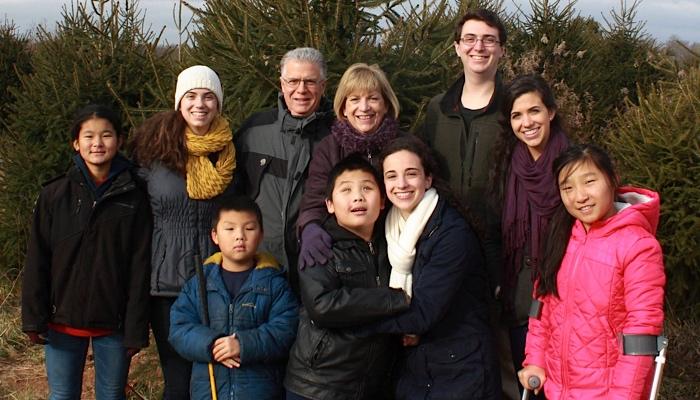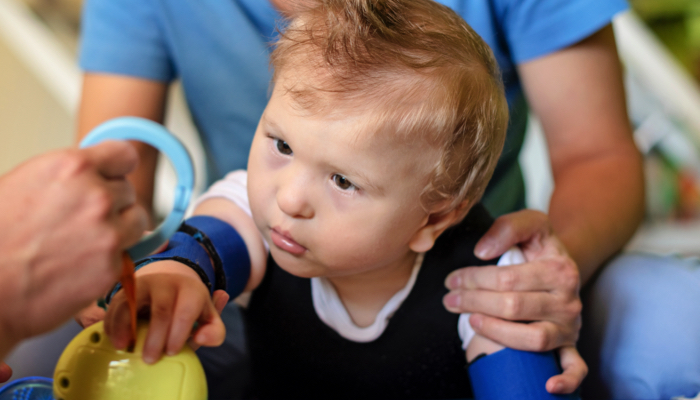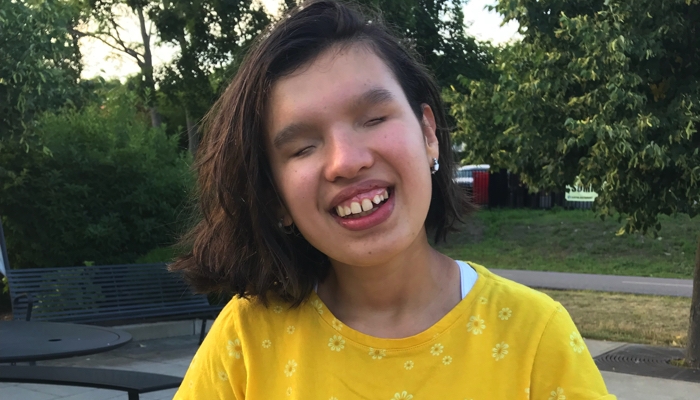Adopting a Visually Impaired Child from China: Our Story

This post may contain affiliate links; please see our terms of use for details.
By MaryAnne Roberto
I have worked as a teacher of blind children for most of my life, but I truly never expected to be the mother of two boys who are blind. They have taught our family so much about life, about joy, about ‘seeing’ what is really important. We began our adoption journey in 2007, to adopt our daughter, Sophie. In the midst of our paperwork to adopt Sophie, we found the file of a little boy.
Children who are blind do not have many families who are interested in them, and our Shane was no exception. There was not one family who had requested to review his file. He held tightly to the rungs of the chair in his picture, his clothes tattered and dirty, his face sweet with the look of a scared puppy. My heart was broken when I thought of him, blind and in need of love and stimulation.
At the time, there were instances occurring where a child would be removed from the adoption list if their file was not reviewed or chosen by a family. If this occurred, no further attempts to seek a family would be made for the child. We had not even left for China to adopt our Sophie, but Shane’s file was about to disappear, and with it, his chances for a forever family. My husband Matt and I talked about it. We had already committed to adopting another child in a few years, so why not now? The adoption agency who held Shane’s file was thrilled at our request to review it, and we were matched with Shane.
We expected Shane to have delays because of his blindness and lack of stimulation in his orphanage setting, but we were surprised at the extent of these delays. Shane needed us more than I had anticipated. We brought home a little boy who was in sensory shock and needed a huge amount of attention, love and care. My husband and I and our four older children had to re-adjust to life with a child with more complicated needs. Shane had almost no self-help skills, he did not know how to hold a spoon, sit on a chair, or open a door. We began at the beginning, and sang songs for all of our household routines in order for Shane to bridge the gap between English and Chinese. At first he did not leave one room, but eventually he began to explore the house and the outside world.
Shane has been home for more than four years now, and has made many changes. He has significant developmental delays, and little to no expressive language, but he has brought so much joy into our lives. Shane has challenges that we were not aware of when we adopted him, and we have had to shift our priorities and change our expectations. There are days that are difficult, nights that seem endless, but when Shane wraps his arms around me to give me a hug, or plants his face on my cheek for a kiss, I know that there is no better place for our son to be than in our loving home. While we do
have more challenges with Shane, we shudder to think of where he would be without us.
Shane’s blindness is not his most challenging special need. His blindness is a part of who he is, but it does not impact him the way people would think. Shane can find me in the house no matter where I am. He can navigate every room of the house, and walks up and down the steps without holding any rails. He steps over objects on the floor (including our dogs) and very rarely trips or falls. He can find objects that have fallen, can feed himself, and he is now using sign language to express his needs. Shane knows every member of our family through his other senses, and can light up the room with his happy smile. The simple truth is, life with Shane is complicated and exhausting, but it has changed all of us in so many wonderful ways, and opened our hearts to welcome Vincent.
We honestly did not expect to adopt again after bringing home Sophie and Shane, until we saw the file of a girl who became our daughter, Maeleigh. At the start of this adoption process, a few days before our first home study meeting with our social worker, we saw a video of a little boy who was waiting in the same orphanage as Maeleigh. My breath caught in my throat as I watched this little boy laughing and playing with his nannies. Totally blind from retinoblastoma, Wei Ping Xian stole my heart instantly. I showed the video to my husband and he was silent for a minute, then said, “That is my son, we have to go and get him.”
Retinoblastoma is a rare form of cancer, which starts in the retina of the eye. Once diagnosed, children receive several rounds of chemotherapy and in severe cases, doctors will decide to remove the eyeball so that the cancer does not spread to the brain. Vincent remembers seeing in China, but both of his eyes were enucleated before he was two years old. He now has two prosthetic eyes. Retinoblastoma has one of the best cure rates of all childhood cancers (95-98%). We completed medical testing once Vincent came home to confirm that the cancer was gone. If his cancer returns one day, we will deal with it with the resources that we have available to us.
When I first took five year old Vincent to the ocular oncologist he was as good as gold, surprising all of the doctors with his mastery of English, his good humor, and his ability to take his prosthesis in and out himself. While we were waiting for the doctors, Vincent asked if he would be getting new eyes. I told him that they might need to get him new prosthesis when he gets older, but not right now. He looked up at me and said, “No, I need new eyes now. I want the doctors to give me new eyes, seeing eyes.” My heart skipped a beat. I looked into the face of the most angelic little boy, and had to tell him the truth. He told me that he wanted to see as his siblings do. Tears filled my eyes when I told him that the doctors could not make him see, that his eyes were too bad in China, and they had to be taken, and that he would not see.
Vincent will never see as we do, that’s a reality that we all have to deal with. I expect that he will mourn the loss of vision all his life, as I know I will. As he gets older he will learn that there are very few things he will not be able to do, few obstacles that will be in his way that he cannot overcome. He will see things with his heart that we will never see, and because he cannot see, he will make us see for him, and thus enrich our lives so deeply. Vincent’s future is bright, the possibilities for what he can do are endless.
Vincent has added so much to our very busy family. He is a little boy who is full of love, full of questions, and full of gratitude for being able to have a new life outside of the orphanage. Matt and our daughter went to China to complete Vincent’s adoption, and as they left the orphanage the guide told him they were going to McDonald’s for lunch. Vincent chatted in Mandarin, excited and happy. When the guide commented to him about how excited he was to be going to McDonald’s, he replied: “I am happy to be going to lunch, but I am MOST happy to be leaving the orphanage.”
In the one short year since his adoption, six-year-old Vincent has learned so much. He speaks English perfectly, he is able to read and write Braille on the first grade level, and walks independently using a cane. He talks incessantly, asks questions incessantly. He wants to know “everything about the world” as he says, and is constantly thirsty for information, for new words, for new experiences. Vincent steals the hearts of everyone who meets him.
As with Shane, his blindness is not an insurmountable special need. Blindness is an inconvenience for Vincent, not an obstacle. He gets aggravated when he cannot do activities that the other kids can do, until we show him how he can. He rides his bike, his scooter, and even our neighbor’s horses. Vincent has his own set of golf clubs and is paired with a golf professional for individual lessons with a local blind golfers association. He keeps us all very busy, and every day he makes us understand how precious life is. The other day he said to me, “Mom, I wish I could see your blue eyes…but I know I can see them with my heart.”
Parenting an adopted child and parenting a blind child both have their unique challenges. When preparing for an adoption, make sure you take full advantage of all of the adoption training on offer. Topics should include separation, loss, grief, bonding, attachment, multicultural and trans-racial adoption, medical needs, openness, trauma, preparing your family, thinking about school, planning for the future and more. It is important for you to be prepared for the unexpected, as in our adoption of Shane. Online parent groups are invaluable sources of hope, encouragement and support, so research these communities before you adopt.
Parenting a child who is blind or visually impaired makes you see the world in a different way, as you must become the eyes for your child. What an amazing gift it has been for our family to hold the hearts and hands of these two little boys as they navigate the world. Our lives would not be complete without them.
This is an exerpt from Exposed to Hope: Stories from Families who have Adopted a Visually Impaired Child from China. This E-book has been compiled by Bethel China and is a compilation of stories of families who have adopted a child with a visual impairment from China. Parents write honestly and beautifully about the why, the how and the what happens next of the adoption process. Through real life examples, they share their experiences of meeting their sons and daughters for the first time, navigating the medical and educational system for visually impaired children, and what life as a family looks like for them. There are 12 more wonderful stories in “Exposed to Hope,” which you can buy on Amazon here. For more information about adopting a child with a visual impairment from China, email adoption@bethelchina.org. You can also visit their Facebook Page where you can learn more about children who are currently awaiting adoption.
Read this article in Arabic: حيوا-السيدة-العمياء
Related Posts

Eye Conditions and Syndromes, Support, Visual Impairment
Coping with a Diagnosis: Emotional Support for Families with Visually Impaired Children
Families with emotional support are more resilient. Learn how to establish emotional support with peers, professionals, and the community to help your family thrive.

Special Needs, Visual Impairment
Why Early Intervention Is Critical for Blind Children
Children diagnosed with visual processing disorders, low vision, or blindness need specialized treatment. Early intervention programs can help.

Eye Conditions and Syndromes, Visual Impairment
Anophthalmia: Navigating the Path from Diagnosis to Adaptation for Parents and Their Children
Anophthalmia is a rare disorder that results in childhood blindness. Early intervention services are important to help your baby maximize their potential.